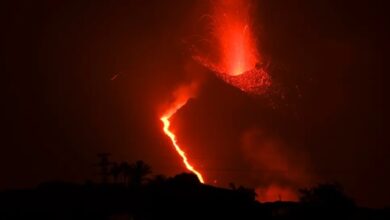Germany is Closing its Nuclear Chapter. What are the Implications?
Germany decided to close its nuclear power plants in a difficult moment for energy security due to the war in Ukraine. However, it is a decision fraught with challenges and controversy.

Photo: Rolf Kickuth
LatinAmerican Post | Sergio Marentes
Escucha este artículo
Leer en español: Alemania está cerrando su capítulo nuclear ¿Qué implicaciones tiene?
Germany shut down its last three nuclear reactors on Saturday, ending more than 60 years of nuclear power use. This decision was made after the Fukushima disaster in 2011, prompting then-chancellor Angela Merkel to speed up abandoning atomic energy. However, the closure of the reactors generated controversy and debate against a backdrop of the climate crisis and war in Ukraine, which has affected Russian gas supplies.
Why did Germany Decide to Close its Nuclear Power Plants?
Germany began its nuclear program in the 1950s with 17 operating reactors, which in 2010 generated 23% of the country's electricity. However, there has been strong social and political opposition for decades to this form of energy, especially from the environmental movement and the Los Verdes party, born in the 1980s as an anti-nuclear force.
In 2000, the Social Democratic-Green government of Gerhard Schröder agreed with the electricity companies to phase out all nuclear power plants by 2022. However, in 2010, Angela Merkel's conservative-liberal coalition revoked this agreement and extended the useful life of the reactors until the year 2036.
This decision changed radically after the Fukushima nuclear accident in Japan in March 2011, which caused a great shock in German public opinion and led Merkel to take a historic political turn. The chancellor then announced the immediate closure of eight reactors and the final disconnection of the remaining nine by the end of 2022. According to a survey that year, this measure was supported by a large parliamentary majority and by 59% of Germans.
Merkel argued that the risks associated with nuclear power were unacceptable and that Germany should bet on renewable energy as part of its energy transition (Energiewende), an ambitious plan to reduce its greenhouse gas emissions and meet the objectives of the Agreement. of Paris on climate change.
We recommend you read: Artificial intelligence AI: the hidden side of water consumption in the digital age
What does the Shutdown of the Reactors have to do with the War in Ukraine and Russian Gas?
The closure of nuclear reactors has posed a challenge to ensuring the security of the electricity supply in Germany, which is highly dependent on natural gas. According to Eurostat data, natural gas represented 26% of gross final energy consumption in Germany in 2019, with Russia being the leading supplier with 46% of the total.
Despite the challenges posed by the closure of nuclear reactors and the reliance on natural gas as an energy source, in a complex context with Russia, Germany demonstrated its commitment to the closure of nuclear power. Likewise, he raised the banner of the fight against climate change and the transition toward a more sustainable economy. The Energiewende led to a significant expansion of renewable energy in the country, which in 2020 accounted for 45% of electricity production. This figure is expected to continue to increase in the coming years.
The closure of nuclear reactors is only one part of a much broader and more complex energy transformation process. However, the position towards atomic energy also has to do with pacifist positions and the rejection of nuclear power due to the dangers it can entail, with examples such as Chernobyl or Fukushima. Thus, at a time of geopolitical and climate uncertainty, they consider that their decision is aligned with the search for a more sustainable future.
In short, the closure of the nuclear reactors in Germany is a decision that has generated controversy and debate, but one that reflects the country's commitment to the transition to a different energy model.
What Challenges are Coming for Energy Management in Germany?
Various environmental NGOs denounced that the country is not doing enough to reduce greenhouse gas emissions. Wolfram König, President of the Federal Office for the Safety of Nuclear Waste Management, noted that: "For future generations, the chapter on nuclear power has not yet been closed." Also, the nuclear chapter is not finished, as years of waste management are ahead. There are 1,900 containers with radioactive waste, which must be moved and managed safely. In the same way, plants must be decontaminated.
On the other hand, the expansion of the use of nuclear energy in countries such as China, Finland, Japan, and Russia raises questions about the safety and sustainability of this technology throughout the world. Although they are less polluting than fossil fuels, any mistake with them can trigger a catastrophe, say those who are against their use. However, various scientists see nuclear energy as a green energy source that should be encouraged. In an interview for ARD, the environmental activist Greta Thunberg pointed out that if nuclear plants are to be replaced with coal, there is no point in stopping their operation.




